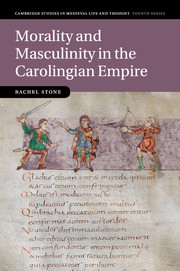Book contents
- Frontmatter
- Contents
- Illustrations
- Acknowledgements
- A note on translation
- Abbreviations
- The Carolingian empire
- Genealogy of Carolingian rulers
- Chapter 1 Introduction
- Chapter 2 Moral texts and lay audiences
- Chapter 3 Warfare
- Chapter 4 Imagining power
- Chapter 5 Central power
- Chapter 6 Personal power
- Chapter 7 Power and wealth
- Chapter 8 Marriage
- Chapter 9 Sex
- Chapter 10 Men and morality
- Bibliography
- Index
Chapter 4 - Imagining power
Published online by Cambridge University Press: 05 November 2011
- Frontmatter
- Contents
- Illustrations
- Acknowledgements
- A note on translation
- Abbreviations
- The Carolingian empire
- Genealogy of Carolingian rulers
- Chapter 1 Introduction
- Chapter 2 Moral texts and lay audiences
- Chapter 3 Warfare
- Chapter 4 Imagining power
- Chapter 5 Central power
- Chapter 6 Personal power
- Chapter 7 Power and wealth
- Chapter 8 Marriage
- Chapter 9 Sex
- Chapter 10 Men and morality
- Bibliography
- Index
Summary
Any discussion of moral norms for Carolingian lay noblemen must include attitudes towards power, since eighth- and ninth-century Frankish society was marked by strong social inequalities. Moralising texts often used a binary opposition between potentes (the powerful) and pauperes (the ‘poor’), although in reality the situation was probably more complicated.
In contrast to late Anglo-Saxon England, Frankish texts stress elite power more than wealth: potentes are far more frequent than divites (the rich). Many Carolingian sources also saw the pauperes in terms of lack of power or dependence, rather than poverty. Some texts, however, do contrast the ‘poor man’ and the ‘rich man’; Hans-Werner Goetz saw the pairing of pauper–dives as typical of narrative sources; it is also found in the lay mirrors. Power and nobility were also closely connected, but not conceptually equivalent. Jonas, for example, complains about the neglect of duty by ‘some powerful men [potentes] and certain noble married women [matronae]’.
- Type
- Chapter
- Information
- Morality and Masculinity in the Carolingian Empire , pp. 116 - 134Publisher: Cambridge University PressPrint publication year: 2011

